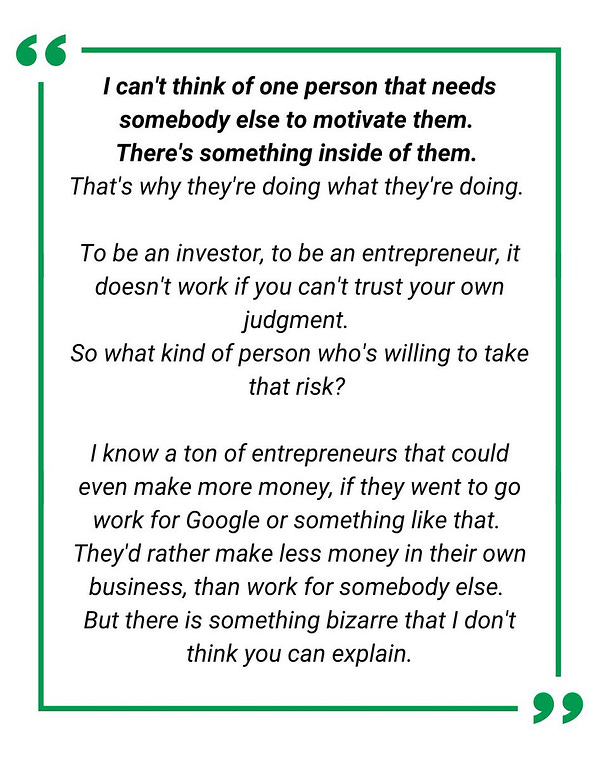I just stopped worrying about stuff.
You only get one go around, I reckon. When you're dead, you're dead. So you can spend your time thinking about how things haven't gone perfectly, or you can just get on with it, and have a laugh.
That's what I do, and I'm pretty happy.
- Neil, The Inbetweeners
A week late I admit and I’m sorry, but I’m finally home after 5 months in Southeast Asia! Boy, it feels good to be back. Let’s crack in!
CHART OF THE MONTH:
READ:
Chips and China
With China’s chip sanctions announced by the US, what does this all mean?
In the medium term, the impacts will be significant, particularly in terms of the stated target of these sanctions — AI. Only now is it becoming possible to manufacture intelligence, and the means to do so is incredibly processor intensive, both in terms of quality and quantity. Moreover, not only does AI figure to loom large in military applications, but is also likely to spur innovation in its own right, perhaps even in terms of figuring out how to keep pushing the frontier of chip design.
In the long run, meanwhile, the U.S. may have given up what would have been, thanks to the sheer amount of cost and learning curve distance involved, a permanent economic advantage. Absent politics there simply is no reason to compete with TSMC or ASML or any of the other specialized parts of the supply chain; it would simply be easier to buy instead of build. Now, though, it is possible to envision a future where China undercuts U.S. companies in chips just like they once did in more labor-intensive industries, even as its own AI capabilities catch up and, given China’s demonstrated willingness to use technology in deeply intrusive ways, potentially surpass the West with its concerns about privacy and property rights.
The big question that I am raising in this article is the short run: […], this move has in fact raised my concern level significantly. I am still, on balance, skeptical about a conflict, thanks in large part to how intertwined the U.S. and Chinese economies still are: any conflict would be mutually assured economic destruction.
How Thailand Became an Auto Export Giant
Another banger from Asianometry. Incredible that he’s able to put out work like this alongside his usual Semiconductor pieces.
The big problem with this exporting success however, is that it is all owned by foreigners. 100% of the management decisions and equity profits from selling Thai-made cars flows up to companies in Japan and the United States.
This traces back to that critical policy change made in the early 1990s. The one that allowed foreigners to own 100% of their joint ventures in the country.
Many of Thailand's auto-suppliers are owned by Thai people, but they remain trapped within the influence of the final assembler - the automaker. Their engineering, design and marketing chops in the consumer space are not competitive. And the sheer size of companies like GM, Toyota, and Honda have kept a Thai-owned brand from ever emerging into prominence.
How the Yakuza took hostage Corporate Japan's Annual Shareholder Meetings
The title is no joke! Not a long one so worth clicking on for a fun read.
Defining “Sōkaiya” is as difficult as defining Geishas. They could be fixers for a firm, making bad press go away. Or extortionists, demanding money from a company to keep quiet. […] Their activities followed a standard procedure. Purchase the minimum number of shares to be eligible to attend a company’s AGM. Before the AGM contact executives threatening to troll them personally or the company in general at the shareholder meeting. Think: real/ imaginary facts about product liability claims, irregularities and payoffs and/ or pointing to personal misconduct, love affairs, etc. If the company had an interest in the AGM proceeding smoothly, they would have to pay off the racketeers by purchasing absurdly expensive subscriptions to useless magazines, paying rent for office plants, etc.
If companies refused, an armada of trolls would stir up the AGM
Legends Of Market History: Tokushichi Nomura II
Tokushichi II is the founder of Japan’s Nomura Holdings, and an OG newsletter writer! He pioneered the Osaka Nomura Business News, a daily newsletter that highlighted the previous day’s trading, stock analysis, and articles on current economic trends. Overall, just a super interesting dude.
Tokushichi II’s life was characterized by relentless determination, massive bets, and innovative ideas that brought credibility to Japan’s investment industry. Initiatives like an in-house research department, daily market news journal, and an evidence/research based approach to investing revolutionized finacial services. There is much to learn from Nomura that is still applicable to all investors today.
Other recommended reading:
Nvidia - Part 4: Valuation and Returns
“the moat that Nvidia has established in its core businesses of gaming and data center currently appears robust, however the risks of competition cannot be ignored. As such I feel it is prudent to reflect this in lower growth rates and lower multiple going forward. The stock is down over 65% from its highs, and I believe annualised returns could be north of 10% from here under the base case I’ve spelled out above, however everyone should take these projections with a grain of salt. There is a wide range of outcomes with a business like Nvidia, and I completely understand that readers may take either a more bullish or bearish view. For me personally, I would wait it to drop closer to $100 for a greater margin of safety.”As US-China relations worsen, expect supply chain chaos
“if the U.S. and China decide to pursue a policy of mutual divestment, we should expect a more diverse, less China-centric trans-Pacific trade. There are other exciting economies in the region that the United States is connected to, including Vietnam, the Philippines, Taiwan, Korea, Japan and Indonesia. Eastbound freight flows may have more widely distributed origins as China’s share diminishes. Ports like South Korea’s Busan, Malaysia’s Port Klang, Taiwan’s Kaohsiung and Japan’s Yokohama could become relatively more important.”Why Chinese students are falling out of love with US universities ($)
“student visas issued to Chinese mainlanders fell 45 per cent in the six months to the end of September from the comparable period in 2019, […] Mainlanders are still going overseas to study, but more are choosing the UK, Singapore and Hong Kong, educational consultants say. Chinese students in the UK rose by 50 per cent between 2016-17 and 2020-21. And India displaced China in US student visa rankings over the past six months. F1 visas for Indian students rose to 87,029, well above China’s 49,959, and almost three times the figure for India before the pandemic.”Ross & Van Compernolle’s country fact sheets for the ASEAN region
You gotta click through to get each report. But a small price to pay for some valuable stats.Shipbuilding 101 ($)
“Environmental regulation will also increase the demand for shipyard capacity, as existing vessels need to be replaced or upgraded to meet the 2050 green goals set out by the industry body IMO. While shipyards have been burdened by rising wages and prices for steel, those headwinds are now disappearing. New-build prices have also gone up, suggesting that yard profitability is about to improve.”
LISTEN:
Asianometry discusses TSMC and the global chip shortage on Analyse Asia [Spotify] [Apple]
If you’re looking to learn more about TSMC and the chip shortage crippling the world, this podcast goes a long way.
Murray Hunter on The Dark Forces Changing Malaysian Society [Spotify] [Apple]
A sobering look into some of the challenges Malaysia is facing today. But the quote I’ll share is a bright spot, and a criticism of Australia I wholeheartedly agree with:
“when I arrived in Phnom Pnom Penh at the airport, I saw the Maybank ATM, and then I saw Malaysia influence in the local economy. And I’ve seen that in Thailand, I’ve seen that in Indonesia. So I see Malaysia’s business expansion into the region. and I look at it through the lens of being in Australian, who in my heart wish that we as Australians had have had the influence that we should have had in Southeast Asia, […] So seeing Malaysia’s taking the opportunity that we missed out on it’s positive for Malaysia, but as an Australian, I’m sad that we missed that opportunity.”
Rei Saito on Japanese Stocks and Tokyo Real Estate [Spotify] [Apple]
Overall banger of an episode that gives a great breakdown of investing in Japanese stocks and the Tokyo real estate market. And Rei’s radio voice is buttery smooth too! My big takeaway:


David Senra on Invest Like the Best [Spotify] [Apple]
Ok, not Asia-Pacific specific. But it is terrific. And David is prolific and obsessive about his content so it isn’t a gimmick. And I’ve run out of crappy rhymes. But seriously, this is one podcast you will likely re-listen to. The nuggets of knowledge and accumulation of so much information about founders and entrepreneurs are second to none.
I’ve written a thread with all my takeaways. But the point below is my favourite:


WATCH:
Same spiel but a different month, the most efficient way to share my video recommendations is through a YouTube playlist. I’ve curated what I’ve found to be the most insightful and interesting videos related to Asia-Pacific for this month. Always open to any suggestions you have though!

BOOKS:
[READ] Defying the Dragon: Hong Kong and the World's Largest Dictatorship by Stephen Vines
Great read, very topical and timely. Steve documents Hong Kong’s recent struggles with the "One country, two systems" model, places it in the wider context of the CCP’s history of dictatorship, and explains Hong Kong’s values of protest and identity.
“Hong Kong has been a place of refuge. A place of opportunity. A haven of stability. And a place famously described by the journalist Tsang Ki-fan as ‘the only Chinese society that, for a brief span of 100 years, lived through an ideal never realized at any time in the history of Chinese societies. A time when no man had to live in fear of the midnight knock on the door.’”
As mentioned, I’m finally back home in Aus! Back to the grindstone (which I’m actually enjoying lol)
Will eventually get around to writing a few pieces based on this experience. Most keen to share how life as a digital nomad is kind of meh. Holidays and travelling? Fuck yeah, amazing. Digital nomad life is bliss and expecting quality work to be done? Good luck to ya.
Overall, I had a blast. But stoked to be home. So from now until the end of the year, expect my work to start ramping up. Hoping to share some quality learnings and takeaways with you again soon!
You can find previous posts here. I also interview legends at Compounding Curiosity, lurk on Twitter @scarrottkalani, and have a Discord server for everything Allocators Asia (I’d love for you to join our cool little community we got going).
Want to get in contact? Reply to this email, comment on Substack, or send a letter via carrier pigeon and trust that fate will deliver it.







Hope you'll have a great time back home 💪
thank you for sneaking in a writeup on a US chip co into an Asia newsletter!